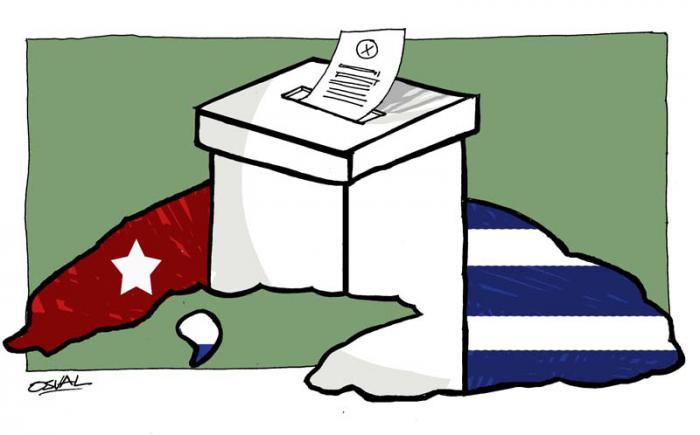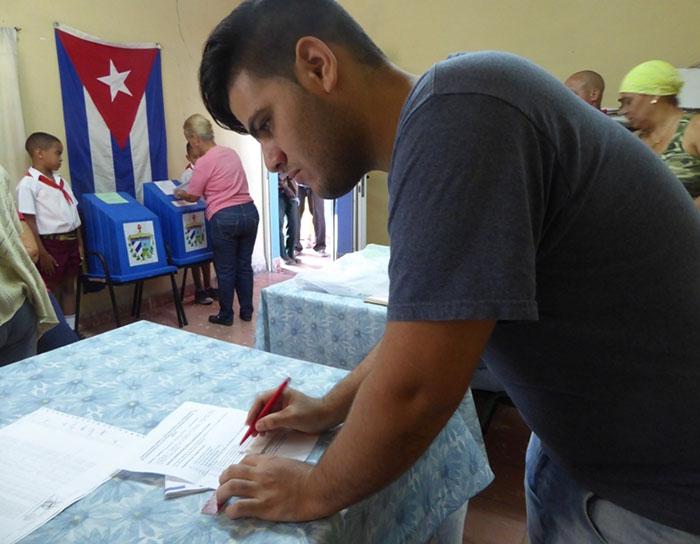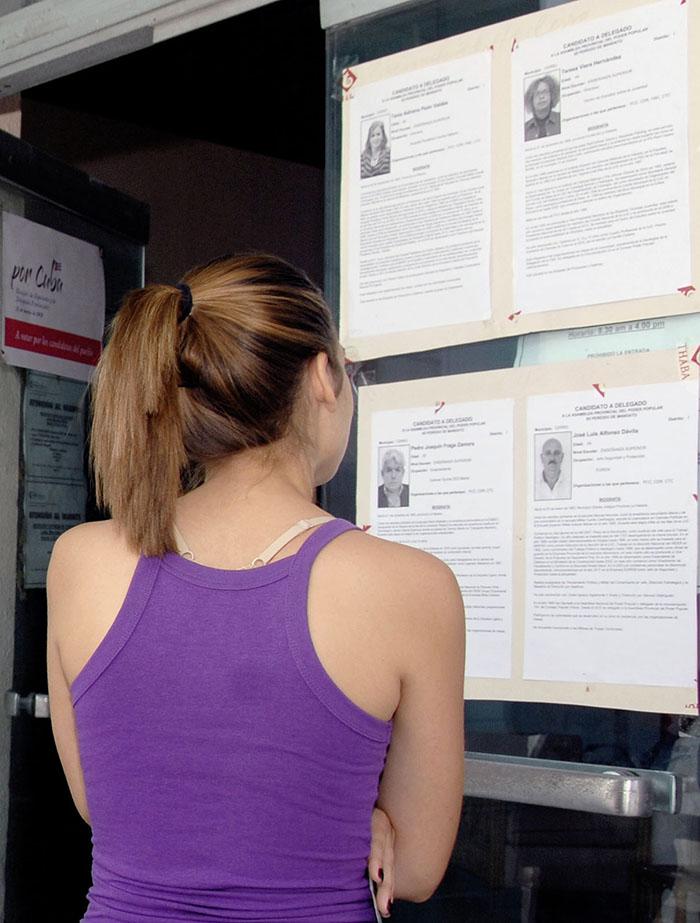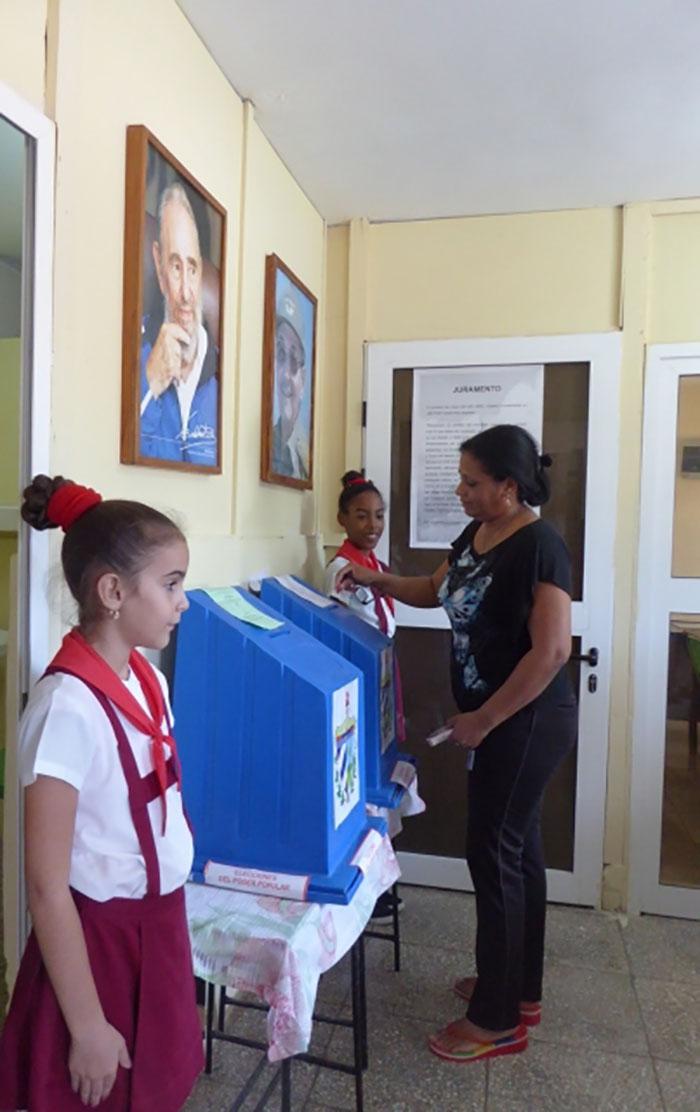
Despite the seasonal time change, millions of Cubans came out early on the morning of Sunday March 11, to vote for 605 Deputies to the National Assembly of Peoples Power and 1,265 delegates to the country’s 15 Provincial Assemblies.
Women and men, young and old, placed their votes in the ballot box guarded by elementary school children, in the free and full exercise of their right to chose the new members of Cuba's Parliament and vote, once again, for Cuba.
CUBAN YOUTH, WITNESSES TO A TRANSCENDENTAL MOMENT
Young Indira Díaz Roques from Pinar del Rio voted for the first time this March 11.
At 16 years of age, she noted that these elections represent a right won by the Cuban people which “today we must defend.”
As such, by casting her ballot, she was not only showing her support for candidates to the Provincial Assembly of People’s Power and Parliament, but also to the process being built by the entire country since 1959.

“We are also voting for Cuba, for the future of our country, for the continuation of the Revolution in these elections,” she stated.
Indira, a student at the Tania la Guerrillera Pedagogical School in Pinar del Río, is training to become a teacher.
“I had participated in other electoral processes, but only as an elementary school student guarding the ballot box, which I loved and regard as a beautiful experience. I always felt proud to be chosen for such an important responsibility.”
Despite this being her “first time” as she put it, Indira explained that she was given sufficient information on how to vote and believes that “the Cuban electoral system is democratic, because we have the opportunity to chose the people that will represent us. No one is pressured to vote for any specific person, it’s a free and transparent process.”
For the young student, “Today is something extraordinary, because with my vote I am reaffirming that I support the Revolution, Fidel, Raúl, and am honoring the memory of those who gave their lives so that we could have a sovereign homeland.”
At 17 years of age, Anabel Yero Ramírez from Granma province and a senior at the Alfredo Velázquez Professional School of Dance, also voted for the first time on March 11, at polling station three in circumscription nine of electoral district three in Guantánamo, which just happened to be located in his very own school.

“A new experience that I have come to fulfill because it’s every citizen’s duty, as well as commitment to Cuba,” stated the young student.
From the Isle of Youth, which received José Martí and Fidel Castro at different historic moments, Adrián Cánovas, fulfilling his responsibilities as president of a polling station in Nueva Gerona, assured that every citizen exercised their right to vote.
Such was the case across the 162 such centers in the Special Municipality as well as several on Cayo Largo del Sur, and those located at ports, airports and hospitals in Nueva Gerona.
Full adherence to the law, honesty, and discipline in the organization, and at every stage of the process, could describe Sunday’s elections, with thousands of residents voting in favor of the country’s political system, which gives every citizen the chance to contribute and be a protagonist in decision making within government.
Meanwhile, fifth year Agronomy student at the University of Artemisa, Armando Muñiz Pino, got up early to join other volunteers, like himself, helping out with elections.
Muñiz noted that he felt proud to have had the opportunity to be one of the first to serve as an election observer, after university students were organized to do so in 2015. This experience, he noted, in addition to the training he received at that time, have helped him better carry out his responsibilities at polling station one, in circumscription seven, in the People’s Council of Mariel, Artemisa.
“Last time was a big challenge, because I had only participated in the elections as a voter, and it is now, too - although I have some previous experience and training – because we have a great responsibility on our hands. The active participation of the new generations is another example of the democracy and transparency of the Cuban electoral system, as well as the trust placed in us,” stated the 23-year old student.

“As a volunteer,” he added “we are much more integrated into the process because we believe these general elections are important. It is fitting that, in addition to university students, now pre-university students and those from polytechnic institutes have been incorporated into the process, for even greater continuity to guarantee the future.”
Meanwhile, Dr. Tania Suárez Ojea, back home vacationing in Cuba for the first time since she began her internationalist mission in Brazil, immediately found her name on the voting register at polling station three, in circumscription 144, in the Ampliación de Terrazas neighborhood of Santiago de Cuba.
“I couldn’t miss the occasion,” she stated “to participate, of my own free will, on this day, in defense of our sovereign and democratic Revolution.
“I am doing so again in the same place where, as an elementary school student I enjoyed guarding the ballot box; while I yearned to grow up so that I could participate in this exercise together with my parents, grandparents, and neighbors.”
“However,” explained Dr. Suárez Ojea “Today I feel a special kind of joy, because last night I had the pleasure of personally greeting our Army General Raúl Castro Ruz, as he passed through CDR No.8, Capitán San Luis. It was like every young revolutionary professional’s dream come true, because in his humility I also saw the greatness of Fidel.”
ANOTHER VICTORY IN THE SIERRA
Minas del Frío (Cold mines) lives up to its name. At 6am on Sunday March 11, the fog and cold, biting wind imposed its will in this remote area - 900 meters above sea level - of the Sierra Maestra, Granma province.
At that time, 30 year old Obisley Reyes was arriving to the polling station with his spouse – hand in hand for a bit of warmth – to prepare the site where 171 residents of the community would shortly arrive to vote, “for a lot more than just the names of the candidates,” he stated.
“It’s that this entire community is a product of the Revolution. We are no longer just four sparsely-spaced houses. There is a doctor’s office, a shop, restaurant, two cooperatives, a farm, a small school where my wife works and where our children will go when we have them.
“There is even a therapeutic rehabilitation center, with everything you could need, where I work to benefit nearby communities. This is why those of us who live in the Sierra Maestra came out to vote, for the good people who will defend us, so that the mountain and the entire country continue to be an example of human dignity.”
A DEMOCRATIC PROCESS
Although Adrián Alejandro Medina Falcón from the province of Villa Clara, is only 18 days old and unaware of the importance of this March 11 for the Cuban people, someday his parents will tell him that he was there, on that historic day.
Wrapped in a shawl in his mother’s arms, Adrián arrived to polling station number one of circumscription 44 in the People’s Council of Sandino, Santa Clara, and after making their way to the election table and then to the voting booth, his mother readjusted him in her arms so she could place her vote in the ballot box with the help of young elementary school students Díaz and Lídice Beatriz Rivero, who attend the local Fe del Valle High School.
“Right now, at this young age, he doesn’t know what’s going on, but one day he will also come here to vote, just like the thousands of young people that are voting for the first time,” stated his father Adrián Medina, who recognized that it is because of processes like this that his son is vaccinated against a number of diseases which continue to kill thousands of children worldwide; will receive a free education and enjoy other guaranteed rights.
Meanwhile, Claudia María Vázquez Bermúdez in Las Tunas, is the type of girl that likes to get up early, motivated by her school and classmates, to learn more every day. This March 11 however, the young student awoke early for a different, but equally important reason: to guard the ballot box.
For Claudia, a seventh grade student at the Calixto Sarduy High School, this is not her first time guarding the ballot box, having done so when she was eight; an experience she fondly remembers today.
“For me it’s an honor to participate in the election process, because we know that in other countries around the world ballot boxes are guarded by armed soldiers, but in Cuba it’s our responsibility, and this makes me very happy.”
Everyone, from the students to their families, has worked hard to ensure that these elections run smoothly, she noted.
“We pioneros (members of the Pioneros José Martí Organization) have come here with great discipline, but we wouldn’t have been here so early, with our uniforms, ready to fulfill this important task, without the help of our families.
“If, someday, I had to carry out another responsibility, like being an electoral authority or even a candidate, I would gladly do so,” stated the student.
UNFORGETTABLE MEMORIES
Early on March 11, Roger Antonio Ávila Rodríguez, a retired judge and unusually energetic for an 83 year old, exercised his right to vote at polling station five, in circumscription two, of Peoples Council one: Alcides Pino, in Holguín.
“I didn’t hesitate even a second in voting for all the candidates. This moment meant saying 'Yes' to Cuba and to unity among all compatriots,” he explained.
Roger also recalled what elections were like before 1959; unforgettable memories, shared as a lesson.
“I was nine years old at the time of the 1944 elections and 13 by the 1948 process. I remember what my father was like. He never used to vote, saying that the Presidents of the country, the mayors, the councilors and all those who lived off politics, only sought those positions to enrich themselves.
“They would do anything to win. For example, in order to admit my sister - who had appendicitis - to the civil hospital in Holguín, the representative, one of those politicians, demanded that every member of my family vote for them. My father refused, preferring to pay for a private clinic with the money he had hastily obtained from selling some cows.
“In those days there was no respect for democracy. In 1952, when I was 17 years old, Fulgencio Batista led a coup d'état. My father said: Now the country’s going to get really bad. And he was right.
“Everything changed with Fidel’s triumph. Today, I’m also voting for him,” stated Roger.
THOSE THAT HAVE WATCHED OUR ELECTORAL SYSTEM GROW
On Sunday March 11, Pacheco (Israel Santiago Romero Llanes) and his spouse Caridad Rodríguez García, left their home hand in hand, just as they have done for the last 50 years; only this time they made their way to polling station one, in circumscription eight, of the Pedro Martínez Brito People’s Council, in Ciego de Ávila, where they cast their votes.
We came out to vote because Cuba needs everyone to be united and we must vote for the replacements of the Revolution which saved many from illiteracy, extreme poverty, and which we have so rigorously defended over the years, explained 84 year old Pacheco.
Miguel Cañellas Pomares, from Cienfuegos, exercised his right to vote from home, where the polling station president and young elementary school student brought him his ballot.
Speaking to Granma, Cañellas explained that he couldn’t walk to the polling station, having recently undergone hip surgery. Had this not been the case, the 80 year old would have gotten up at first light to vote, typical of his character.
“Voting for Cuba means voting for our history, for our founding fathers, for the historic ideal of sovereignty and independence, it's voting for the continuation of the Revolution and for this great people,” he stated.
Meanwhile, 78 year old Magalys Hernández, also exercised her right to vote from the comfort of her home in Mayabeque. Although her legs are no longer able to carry her to the Alberto Monté Gil High School, where polling station one of circumscription 11 in the People’s Council of Guara, Melena del Sur, was set up, this didn’t stop her from participating in Sunday’s elections.
A young elementary school student, accompanied by Consuelo García Fajardo, a member of the polling station staff, brought Magaly her ballot so that she could vote from home.
In secret, Magaly cast her vote, folded the ballot papers and place them in an envelope before they were deposited in the ballot box by Consuelo García Fajardo and the young pionera.
In this same way, just like Magaly, other residents in the area were able to exercise their right to vote from home. Although health issues may have prevented them from reaching the polling station, it didn’t stop them from saying 'Yes' to Cuba and the Revolution.
For 72 year old Heriberto Sosa Casanova, from Matanzas, the March 11 elections are of great importance for the country and vital to strengthening unity among Cubans.
“These are different times, but we must still turn to the teachings of the historic leader of the Cuban Revolution to understand that today, as we choose the Deputies to the National Assembly of People’s Power and delegates to the provincial assemblies, we are also voting for Cuba and the for present and future of socialism,” he noted.
These election are “also a vote for Fidel, who on Sunday June 30, 1974 came to Matanzas to observe the development of the first truly democratic elections in Cuba, the purest elections in our country’s history, when the People’s Power experience, a new form of government that was later implemented across the country, was put into practice,” added Sosa.
From Sancti Spíritus, Pedro Iglesias Marrero, president of the electoral commission in the municipal capital, has been involved in electoral processes in Cuba for over 30 years, noting that he has witnessed “our electoral system grow, from the one we started, with teleprinters, to the one we have now where everything is computerized,” and loves “this task which has given me a lot of experience over all these years.”
A STORY OF CONSTITUTIONALITY, FREEDOM & JUSTICE
After casting his vote in one of the polling stations in the neighborhood of Los Coquitos, Camagüey province, Fernando Crespo Baró, research specialist at the Camagüey City Historian's Office, publicly announced:
“I just voted for all the candidates, not because I liked any particular one, but for Cuba and her democracy, for the continuation of the Revolution which will soon celebrate 150 years.
“This is the legacy,” he noted “that the deputies Carlos Manuel de Céspedes, Ignacio Agramonte Loynaz and Miguel Jerónimo Gutiérrez from Guáimaro, left us. We have an entire history of constitutionalism, freedom, and justice.”
Fernando, also a member of the Association of Combatants of the Cuban Revolution, went on to explain that the candidates have a political, revolutionary, and patriotic commitment, are honorable and decent, in whom the people are placing their trust.
“This,” he noted, “is a legitimate process. I voted for the lecturer, the university professor, the worker, and the campesino, for the manager, for the homemaker, for the doctor, for the athlete. All of whom have merit and will to take our country forward.”
According to Crespo, “Cuba has achieved an extraordinarily high level of democracy, but we are still not satisfied, we’ll have to work to raise levels of citizen participation, with their direct contributions and ideas, toward the construction of a better homeland.
“It is up to us Cubans to continue improving,” he noted, “No one can come here and give us lessons in democracy: politicking, demagogy, fraud, ballot boxes guarded by firearms… These things that they try to sell us, we’ve known about for a long time.”















